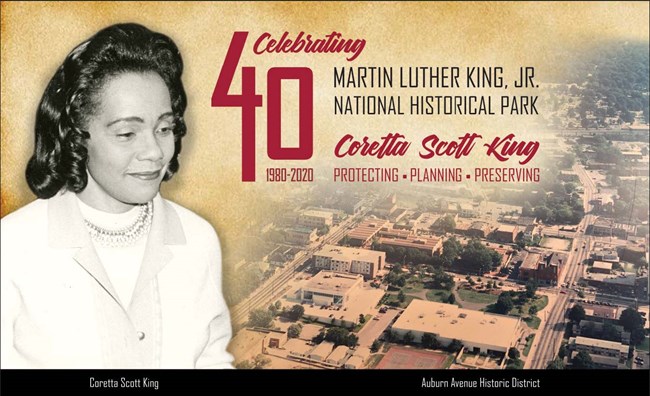
Designed by Donald Bermudez She further iterated that, ". . . the Center would seek with integrity to memorialize Martin Luther King's best hopes and deeds." Mrs. King's vision focused on the construction and development of The King Center campus, the acquisition and restoration of the King Birth Home, the promotion and preservation of Ebenezer Baptist Church, and the rehabilitation and development of the 23-acre neighborhood. She was a pivotal force in the establishment of the King National Historic Site. Mrs. King lobbied for the enactment of legislation designating The King Center’s Freedom Hall Complex (including the Chapel of all Faiths, the Eternal Flame, Freedom Walkway, Exhibition Hall, Archives Programs and Administration building, and the King Crypt within a reflecting pool ) Ebenezer Baptist Church and the larger historic Sweet Auburn community as a National Historic Site and Preservation District. In 1978 the King Memorial Center changed its name to the Martin Luther King, Jr. Center for Nonviolent Social Change, Inc. (The King Center), with the objective of providing programs and training in Dr. King's Philosophy and methodology of Nonviolence. Prior to Dr. King's assassination, Mrs. King's initial vision was to create the Martin Luther King, Jr. Library Project which would accommodate the voluminous files and books of Dr. King, as well as organize materials relevant to his life and work. This effort was later expanded to include the acquisition, promotion, and preservation of information relevant to organizations and individuals in the American Civil Rights Movement by way of a Library Documentation Project. In part, due to Mrs. King's vision, there exists today important links to the accurate understanding of the Civil Rights Movement and the compilation of the largest repository of primary source materials on Dr. Martin Luther King, Jr., and the American Civil Rights Movement in the world. These primary source records are housed in the King Library and Archives at The King Center where researchers and scholars from all over the world visit year-round. It is significant to note Mrs. King‘s vision for the establishment of a national holiday in honor of Dr. Martin Luther King, Jr. is now observed across the United States of America and in more than 100 nations worldwide. Mrs. King carried the message of nonviolence and the dream of the Beloved Community. She lived her phenomenal life as a woman of wisdom, compassion, hope, and healing. Her vision for the beloved community, her work for nonviolence placed her at the forefront of leadership for peace, love and social change. "I'm not a ceremonial symbol, I am an activist." - Coretta Scott King Back
|
Last updated: October 8, 2020
